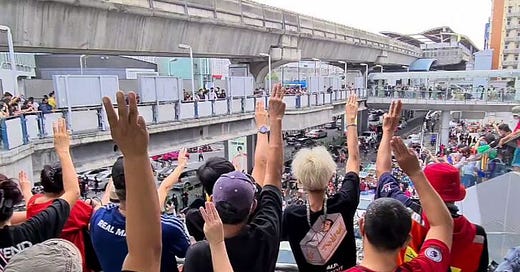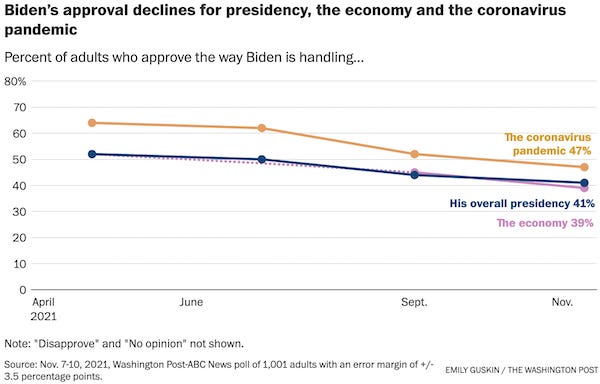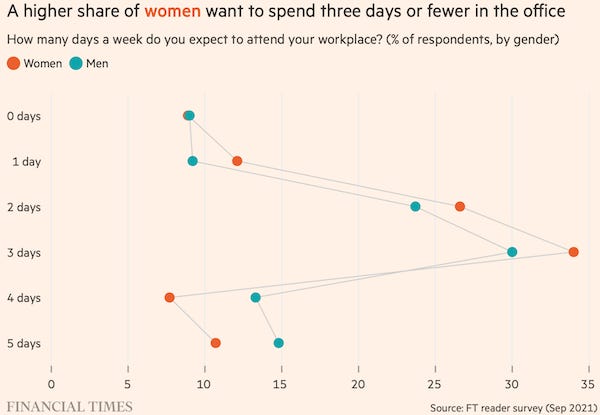CR note: I hope you saw yesterday’s “Subscription Update” email explaining why, starting Nov. 21, free subscribers will no longer get weekday newsletters like today’s edition.
I received many notes of support — thank you!
I also received several versions of the same question: How much does the subscription cost?
Apologies — the red “subscribe” button takes you to the pricing, but I should have made it clearer:
With the 40% Black Friday discount, the cost is $60 for year one.
Subscribers will get an email notice before the time of renewal, which would be at the regular annual price of $100 (BTW, there’s also a monthly option of $10/month).
Continued thanks for considering the subscription. Again — please reply to this email with any questions (or, just hit the red button!)
Today’s posts that caught my eye:
The FT published its “return to the office” survey, “as more than 1,000 readers — from London to Qatar — shared their concerns and hopes.” The survey put some data behind the trend I keep seeing: A significant post-Covid gap between men and women’s expectations about time spent at home and at the office.
A small item that I believe carries greater meaning: Unable to win Beijing’s approval, Fortnite gives up on China, Bloomberg reports. Fortnite’s one of the most popular games in the world… it can’t find a way to exist in China?
The new WaPo-ABC poll delivers bad news to Biden about his approval ratings. Less well reported: “The poll finds overwhelming support for parents having a say in what their children’s schools teach, including nearly half of adults saying parents should have ‘a lot’ of say on matters of curriculum.” More evidence, it would seem, of a major 2022 midterms issue.
The World
Joe Biden and Xi Jinping will discuss ways to prevent tensions from spiraling into conflict when the US and Chinese presidents hold a virtual meeting today amid rising concern about Taiwan and Beijing’s nuclear arsenal. The two leaders have held two calls this year but people familiar with the virtual meeting said both sides were lowering expectations about outcomes from the discussion, which is not being billed as a “summit.” (Financial Times)
Support for Taiwan is a threat to peace, Chinese President Xi warns Joe Biden. (The Times)
Beijing accused the EU of risking damage to world supply chains by throwing up regulatory and trade hurdles to foreign businesses, warning “discriminatory” practices could strain the global recovery from the coronavirus pandemic. The Chinese ambassador to the EU said the European Commission’s drive to sharpen its trade toolkit was seen by some businesses as heralding “more inward-looking and unilateral measures” and the creation of “new trade barriers”… “The moves taken by the EU will also have global consequences, and such moves might create further stress to the global supply and industry chain,” said Zhang Ming in an interview with the FT. (Financial Times)
Thousands of Thais took to the streets of the capital demanding reforms of the monarchy, defying a court ruling that such demands are a veiled attempt to overthrow the institution. Youth-led protests that began last year by calling for the removal of Prime Minister Prayuth Chan-ocha, 66, a former coup leader, have become the biggest challenge in decades to the monarchy which is constitutionally enshrined to be held in "revered worship.” (Reuters)

The EU will tighten sanctions on the Belarus regime by targeting those closest to its authoritarian leader, the union’s top diplomat has said, as ministers prepare to step up their response to what Brussels terms a “hybrid attack” at its eastern border. Meanwhile, Poland’s prime minister said NATO must take "concrete steps" to resolve the migrant crisis on the Belarus border, adding that Poland, Lithuania and Latvia may ask for consultations under the alliance's treaty. (Financial Times, Reuters)
Boris Johnson's Conservatives have lost their lead in two opinion polls after a growing parliamentary standards scandal prompted almost two thirds of respondents in one survey to say the British prime minister's party was disreputable. (Reuters)
Support for Australian PM hits 18-month low just months out from election. (Reuters)
North Korea is converting an air base near its border into a disinfection facility for containers transported by train, a move analysts say may lead to the resumption of trade with China. Satellite images from the CSIS think-tank seen by the FT reveal the building project at Uiju, near North Korea’s north-west border with China, following two years of isolation and economic struggle. (Financial Times)


The White House named former New Orleans Mayor Mitch Landrieu as the senior adviser responsible for coordinating the implementation of the $1.2 trillion bipartisan infrastructure bill. President Biden is due to sign the bill today, when he plans to tout how the core piece of his signature domestic agenda will "deliver to American families." Landrieu will oversee funds for upgrading roads, bridges, rail and high-speed internet, among other responsibilities. (Axios)
Exiles march in solidarity in Miami as crackdown intensifies ahead of Monday protest in Cuba. (Miami Herald)
Antiviral pills could be game-changers: Two new antiviral pills to treat COVID-19 — molnupiravir, developed by Merck, and Pfizer’s Paxlovid — could be game-changers for the pandemic. The companies say that both drugs significantly cut the risk of hospitalization and death in vulnerable people, if used early. Scientists are poised to discover how well the drugs will work in the real world, their safety for a wide range of people, their effectiveness against viral variants, and how easily they will get to the people who need them most. There’s also the concern that the coronavirus could become resistant to antivirals. (Nature)
Oklahoma National Guard changes policy on COVID-19 vaccinations: The action came after Gov. Kevin Stitt relieved then-Adjutant General Michael Thompson of his duties and announced that Mancino would be his replacement. The old policy aligned with federal requirements for vaccinations. The new policy says soldiers and airmen and women who do not wish to be vaccinated do not have to be while they are serving in state. (Tulsa World)
A new WaPo-ABC poll President Biden’s approval rating down to 41%, with 53% of respondents disapproving. The poll was conducted Nov. 7-10 — after the passage of the bipartisan infrastructure package (BIF). But the numbers for Biden get even worse than that: 63% of respondents said Biden has accomplished “not very much” or “little or nothing” so far in his presidency. A full 45% said he’s done “little or nothing” — that’s worse than the numbers for then-Presidents Trump, Obama or Clinton at comparable points in their presidencies. Just 31% said he’s kept most of his major campaign promises — also a worse figure than Trump, Obama or Clinton received. There’s also a tsunami warning for Dems: 51% of registered voters said they’d vote for the generic Republican congressional candidate if the elections were today. That is the highest number ever for Republicans in the 40-year history of this question being asked in this poll — higher than it was ahead of the GOP waves in 2014, 2010 or 1994. (Politico, Washington Post)
Biden’s $1 trillion-plus social spending plan will probably have to wait several weeks to hit the Senate floor. With Congress reconvening today and the House still working to pass the massive climate, safety net and tax package, the Senate will likely turn instead this week to the massive annual defense policy bill, Senate Majority Leader Chuck Schumer said. That’s because even if the House passes the so-called budget reconciliation bill this week, there’s still work to do to ready the legislation for the Senate floor. (Politico)
Economy
China’s economic recovery stabilized as retail sales, industrial production growth beat expectations. Retail sales and industrial production rose by 4.9% and 3.5%, respectively, in October from a year earlier. Fixed-asset investment grew by 6.1% in the January-October period, while the surveyed jobless rate remained at 4.9% in October. (South China Morning Post)
Japan's economy contracted much faster than expected in 3Q21 as global supply disruptions hit exports and business spending plans and fresh COVID-19 cases soured the consumer mood. The economy shrank an annualized 3.0% in July-September after a revised 1.5% gain in 1Q21, much worse than a median market forecast for a 0.8% contraction. While many analysts expect the world's third-largest economy to rebound in the current quarter as virus curbs ease, worsening global production bottlenecks pose increasing risks to export-reliant Japan. (Reuters, Nikkei Asian Review)
$76 billion a day: How Binance became the world’s biggest crypto exchange. The trading platform surged by operating from nowhere in particular—without offices, licenses or headquarters. Now governments are insisting on taking some control. (Wall Street Journal)
The disruption to supply chains that has bedeviled the bike industry since the pandemic is deepening, a manufacturer of parts used by riders in the Tour de France and Olympics has warned. Federico Musi, chief executive of Look Cycle, a French company whose high-end products span clipless pedals, carbon frames as well as whole sports bikes, said the delivery times for parts it buys from overseas continue to lengthen. (Financial Times)
Return to the office survey: More than 1,000 readers — from London to Qatar — shared their concerns and hopes. There was optimism about hybrid work, a blend of office and remote working, as people from sectors including travel, technology and financial services, spanning all levels of the workforce, seized on it as an opportunity for both men and women to enjoy the companionship of the office, as well as attend to personal lives. But there was also concern that flexible arrangements could falter because of poor management, and as face-time re-emerges as a feature of working life. One particular worry was that hybrid work patterns might intensify gender inequality. Men and women differ on their expectations about time spent at home and at the office. 73% of female respondents predict spending between one and three days in the office once all Covid-related restrictions lifted, with only 18% opting for four or five days. Among male respondents, however, 63% planned to come to the office for one to three days, with 28% expecting to attend on four or five days. (Financial Times)
Technology
China’s internet regulator released draft rules that would require companies listing in Hong Kong to undergo a cyber security review if the share sale could implicate national security, threatening a recent shift by tech groups to the territory. The Cyberspace Administration of China, the country’s powerful data watchdog, announced in July that it would tighten rules for companies seeking to list overseas, with those that hold data on more than 1m users required to pass a security review. (Financial Times)
How Alibaba tracks China's delivery drivers: The food delivery service Eleme, owned by Alibaba, built a Bluetooth tracking system to make “instant delivery” a reality. (MIT Technology Review)
Unable to win Beijing’s approval, Fortnite gives up on China. The government’s hostility to the industry is weakening prospects for game makers. (Bloomberg)
IBM has created a quantum processor able to process information so complex the work can't be done or simulated on a traditional computer. Quantum computing could help address problems that are too challenging for even today's most powerful supercomputers, such as figuring out how to make better batteries or sequester carbon emissions. IBM says its new Eagle processor can handle 127 qubits, a measure of quantum computing power. In topping 100 qubits, IBM says it has reached a milestone that allows quantum to surpass the power of a traditional computer. (Axios)
Apple’s rivalry with Meta isn’t about privacy — it’s about AR, watches and home devies. (Bloomberg)
Trapped in the metaverse: Here’s what 24 hours in VR feels like. Everyone is blabbing about the metaverse. But what does this future digital world look like? WSJ’s Joanna Stern checked into a hotel and strapped on a virtual-reality headset for the day. She went to work meetings, hung out with new avatar friends and attended virtual shows. (Wall Street Journal)
Smart Links
A missing piece of the moon may be following earth around the sun. (New York Times)
Meet Ji-Young, the first Asian-American ‘Sesame Street’ muppet. (South China Morning Post)
Why Pfizer won’t share its $36 billion secret vaccine formula. (Bloomberg)
Virgin Atlantic ready to make U-turn and land again at Gatwick. (The Times)
Nearly two fifths of Scots back building of new nuclear plants. (The Times)
COP26 opens path to international carbon trading. (Wall Street Journal)
Renters who abandoned their city apartments during Covid are coming home to a crazy leasing market. (Wall Street Journal)
Elon Musk spars with Bernie Sanders, offers to sell more Tesla stock. (Reuters)
Good News
‘I wanted less than a minute’: 105-year-old unsatisfied after 100m world record. “It was wonderful to see so many family members and friends. But I wanted to do it in less than a minute,” Julia “Hurricane” Hawkins said after the race, where she recorded a time of 1:02:95, a record for women in the 105+ age category. (The Guardian)
Are you on TikTok and a history lover? Then you may like following @365history. The account is run by a teacher in Lynn, Eugene Shultz, who creates "this day in history" videos to help make learning more fun. He already has over 60,000 followers. (WBUR)

Starting Nov. 21, free subscribers will no longer get weekday newsletters like today’s edition. Click the red “Subscribe” button to see pricing options.





